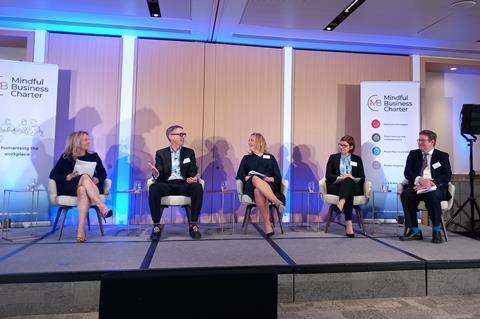As the law focuses on mental health, aggressive and belligerent litigators appear to be an archaic breed. New guidance from the Mindful Business Charter aims to bring the profession up to date
For all the fine words contained in new guidance on good practice in litigation, one contributor neatly summed it up in just a few: ‘Don’t be an arsehole.’ While swathes of the legal profession have embraced wellbeing and collaboration, litigation is seemingly stuck in a time warp.
Litigators, so the cliché goes, must be ’attack dogs’ to their opponents and beholden to clients at any time of day or night. They must be unrelenting, aggressive and intimidating, no matter what.
Evidence is growing that this attitude is causing a crisis in lawyers’ mental health. The stress of being on call 24/7 and on the receiving end of a belligerent opponent can trigger serious problems.
The charity MBC, which promotes the Mindful Business Charter that was devised in 2018 by banking giant Barclays, Pinsent Masons and Addleshaw Goddard to improve workplace wellbeing, formed a taskforce last year to address this issue.
Litigators shared experiences of fractious relations with opponents, documents served late on Friday evening, being bombarded with multiple letters or emails, instructions from clients to behave aggressively, and unreasonable deadlines. MBC hopes the resulting guidance, launched at DLA Piper’s London offices this week, will be a turning point.
‘It is possible to be both a formidable litigator and a nice person and cooperative with it,’ said Naomi Pryde, a litigation partner at DLA Piper and member of MBC’s taskforce. ‘I feel a sense of pride when someone on the other side tells me they are glad I’m there as I’m sensible and pragmatic.’
Richard Martin, a former employment lawyer and now executive officer at MBC, said: ‘This should be part of the DNA of our profession, for the health of all of us but also for better litigation and therefore the best interests of our clients.’
The charter advocates greater cooperation; remembering the duty to the court as well as the client; remaining objective and dispassionate; demonstrating humanity and respect; reducing unnecessary aggression toward opponents, avoiding knee-jerk responses; and treating all parties with courtesy.
'[The Mindful Business Charter] is about sitting back and asking, "Am I doing this for the right reasons or simply to aggravate?"'
Stephanie Lee, Travers Smith
The MBC’s taskforce is not blind to the main problem most litigators face when asked to take the sting out of the process and work collaboratively: client expectations.
‘One of the barriers we all have to discuss is clients,’ said Katie Byrne, partner in the disputes resolution team at Irwin Mitchell. ‘They understand litigation to be an aggressive format. The onus is on us to educate them that their litigation can be even better if their lawyer is in a better place.’

James Boon, partner in the IP disputes team at Bristows, observed: ‘I’ve experienced relationships that were quite aggressive and antagonistic where there was an emotional component – there’s no correlation between that behaviour and positive outcomes for the client.’
The judiciary has a role to play too. Byrne said there are increasing instances where judges hit lawyers for costs where they are seen to have acted unreasonably to opponents. Pryde added: ‘We’ve seen an increasing lack of patience from the judiciary for emotive language.’
Crucially, of course, we still have an adversarial system. Nobody expects lawyers to walk in waving the white flag.
‘You’re fighting for your client and trying to achieve the best result for them,’ said Stephanie Lee, partner in disputes resolution at Travers Smith, ‘There may be occasions where you want to pursue a course of action that’s in your client’s best interest and this guidance doesn’t stop that, but it’s about sitting back and asking, “Am I doing this for the right reasons or simply to aggravate?”.’
For all the rhetoric and public commitment to change, scepticism about the charter among the profession remains widespread. One experienced disputes resolution solicitor, speaking privately at the launch event, said the level of nastiness from opponents now is unlike anything he has experienced in 30 years of practice.
Boon agreed that this process will need buy-in from all sides and a universal agreement to down weapons and act constructively.
‘The challenge is there is a degree of trust required. There are certain firms you can have discussions with and be honest and open. Where the trust is missing [it is a problem].’
Lawyers generally agree that dialogue, and ideally meeting face-to-face, is enough to reduce some of the tension in a situation. But when an opponent’s conduct is having an effect on your mental health, don’t try to match or outdo them.
‘If someone is being really difficult you don’t have to engage with everything and sometimes doing nothing is the best response,’ said Boon. ‘I often think, “Is a judge going to be interested in this?” If I’m getting all sorts of emotive correspondence, I find these letters get short shrift if they ever come to court.’




































No comments yet